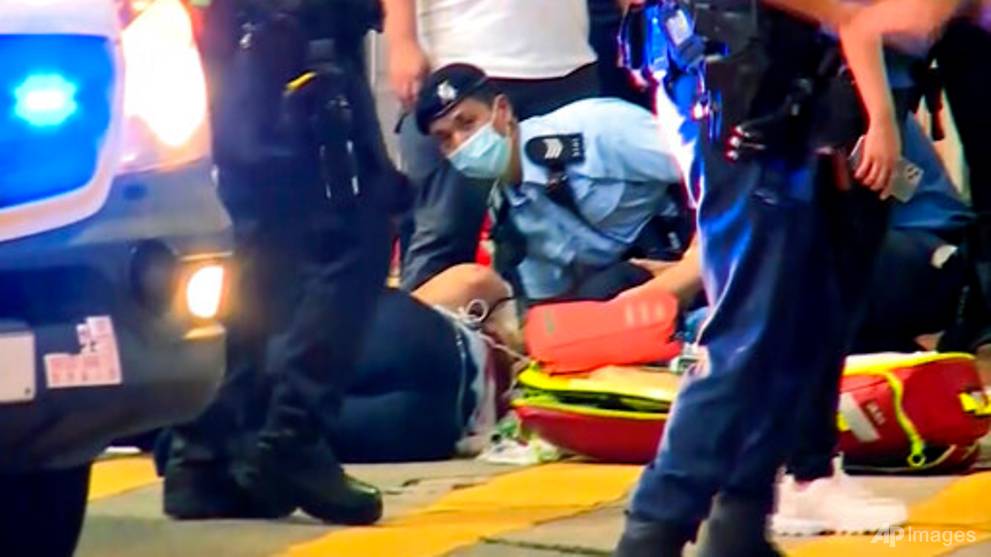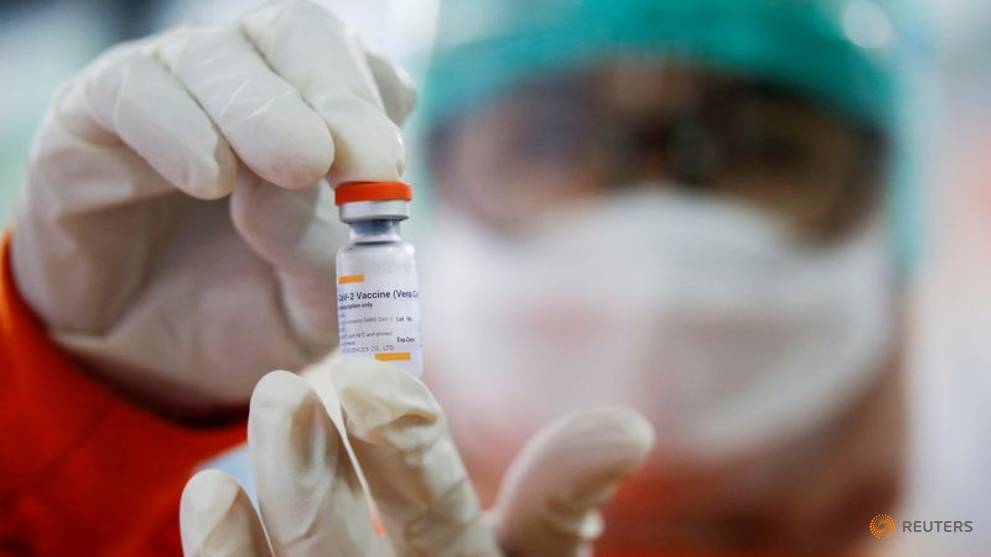
HONG KONG: A Hong Kong police officer who was stabbed in the back has been moved from critical to serious condition, officials said on Friday (Jul 2), indicating a likely recovery from the incident in which the assailant later stabbed himself and died.
Authorities were still looking into the motivation behind Thursday night's attack, which followed annual commemorations of Hong Kong’s handover from British to Chinese control in 1997, as well as the centenary of the founding of China’s ruling Communist Party.
The attack comes amid a sweeping crackdown on political dissent, with authorities banning large-scale demonstrations and arresting scores of pro-democracy activists over the past year.
Authorities said that the assailant was a 50-year-old man, but did not identify him. He allegedly stabbed the police officer in the back with a knife, and then turned the knife on himself.
Hong Kong Security Secretary Chris Tang said it appeared to be a “terrorist act” committed by a single individual that he described as a “lone wolf", but said others were guilty of egging-on such violence.
“I would like to state that it was not just the assailant who was responsible. There are also many people who have encouraged violence and incited hatred toward society and the country, and have beautified these violent acts,” he said on Friday.
READ: Security tight in Hong Kong on China anniversary, official says city now stable
Hong Kong Chief Executive Carrie Lam said it was “very regrettable that this has come at a time when everyone in Hong Kong sets great store by the peaceful situation we have achieved".
The officer was attacked outside the Sogo department store in the busy Causeway Bay shopping district where police were standing guard to prevent demonstrations.
Michael Gazeley, a Hong Kong resident who was at the scene when the attack happened, said that there was heavy police presence in the shopping district and that the situation seemed “peaceful” before the attack happened.
“As soon as the attack happened, a mass of police ran to help their colleague,” said Gazeley.
Hong Kong's hospital authority on Friday confirmed the improvement in the condition of officer, who has not been identified apart from that he was a 28-year-old member of the elite Police Tactical Unit.
Hong Kong has protected the identities of police officers since the onset of increasingly violent demonstrations in 2019 led by protesters opposed to the semi-autonomous region's Beijing-backed government.
READ: Hong Kong silenced as China celebrates Chinese Communist Party centenary
Demonstrations largely ended after opposition figures won big in elections for local councilors, but the central government swiftly moved punish those behind the protests and stamp out any challenges to its authority.
That was spearheaded by the imposition last year of a sweeping national security law and followed this year by alternations to representation in the city's Legislative Council to ensure a strong pro-Beijing majority. Both measures were enacted by China's ceremonial legislature, the National People's Congress, without Hong Kong voters being given a say.
On Friday, pro-democracy activist Chow Hang Tung — known for helping to organise the annual Jun 4 candlelight vigils in commemoration of the 1989 incident in Beijing’s Tiananmen Square — was charged in court for inciting others to join an unauthorised assembly.
READ: Hong Kong court denies bail to democracy activist
Chow was first arrested on Jun 4 and then released on bail, but was rearrested this week a day ahead of the handover anniversary. She was not given bail on Friday.
Large-scale independent political gatherings have been banned and most opposition figures have been imprisoned, intimidated into silence or fled abroad.
Last month, police arrested seven journalists and executives of the now-defunct Apple Daily, a newspaper that was a vocal critic of Hong Kong and China’s governments. Authorities also froze US$2.3 million in assets linked to Apple Daily, forcing it to cease operations last week.
https://news.google.com/__i/rss/rd/articles/CBMibGh0dHBzOi8vd3d3LmNoYW5uZWxuZXdzYXNpYS5jb20vbmV3cy9hc2lhL2hvbmcta29uZy1wb2xpY2UtY2F1c2V3YXktYmF5LXN0YWJiaW5nLWNvbmRpdGlvbi1pbXByb3Zlcy0xNTEzOTU0NNIBAA?oc=5
2021-07-02 12:07:27Z
52781709899057

